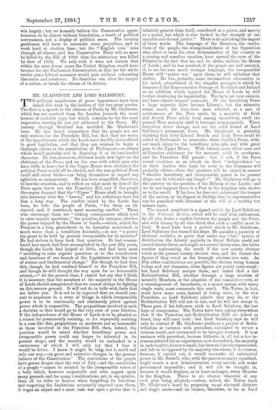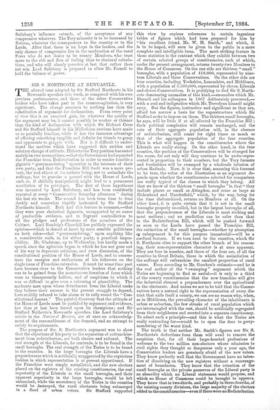MR. GLADSTONE AND LORD SALISBURY.
TWO political manifestoes of grave importance have been issued this week by the leaders of the two great parties. The first is a speech to the citizens of Perth by Mr. Gladstone, which has not received from the London journals the usual honour of readable type, but which contains by far the most impressive warning he has yet addressed to the Peers. His journey through Scotland has modified Mr. Gladstone's tone. He has found everywhere that the people are not only anxious for the Franchise Bill, but that they are weary of the impediments which the Lords have for fifty years offered to good legislation, and that they are anxious to begin a thorough reform in the constitution of Parliament,—a reform which would probably end in depriving it of its two-headed character. He has, moreover, obtained much new light on the obstinacy of the Peers, and on the ease with which men who have little to lose—for if the Upper House were abolished the political Peers would all be elected, and the non-political Peers could still shoot birds—can bring themselves to regard any agitation as unimportant. He has been compelled, therefore, to face the situation, and to reflect on what must be done if the Peers again throw out the Franchise Bill, and if the people thereupon demand that the " Upper " House shall be brought into harmony with the "Lower," and his reflections have led him a long way. The conflict raised by the Lords has been, he tells the people of Perth, "for them an ill- starred, and, if continued, most menacing conflict." Those who encourage them are "risking consequences which tend to raise organic questions ;" the question, for instance, whether the power enjoyed by the House of Lords,—which, added the Premier in a long parenthesis to be hereafter mentioned, is much worse than a hereditary Assembly,—is not "a power too great to be held by persons irresponsible for its exercise." He had striven to keep back that question. He had remem- bered how much had been accomplished in the past fifty years, though the Lords had helped so little, and had been most "unwilling to raise organic questions as to the constitution and functions of one branch of the Legislature with the view of serious and fundamental change." But though he had done this, though he had confined himself to the Franchise Bill, and though he still thought the way open for an honourable retreat,—" At the present time, I cannot but say that I think it is necessary that the members of the majority in the House of Lords should comprehend that we cannot always be fighting on this narrow ground. It will not do to trifle with facts that
are before you. It is not to be expected that we should con- sent to acquiesce in a state of things in which irresponsible power is to be continually and obstinately pitted against power which is responsible. The propositions involved in such a doctrine as that would go to the very root of your liberties. If the independence of the House of Lords is to be pleaded as a reason for permanently resisting, or fcr repeatedly resisting in a case like this, propositions so moderate and so reasonable as those involved in the Franchise Bill, then, indeed, the question would be raised whether hereditary power and irresponsible power could any longer be tolerated in its present shape, and the country would be embarked in a controversy of which I will only say that I fear it would be bitter. I know it might be long, but it could end only one way,—in great and extensive changes in the present balance of the Constitution." The convictions of the people have grown deeper since the vote of July ; and the convictions of a people "cannot be resisted by the irresponsible voices of a body which, however respectable and even august upon many grounds and for many considerations, yet, in my opinion, loses all its titles to honour when forgetting its functions and forgetting the limitations necessarily imposed upon them, it wages an unjust and a most rash war upon a power that is
infinitely greater than itself, considered as a power, and merely as a power, but which is also backed by the strength of im- mutable and eternal justice." There is no mistaking the import of those words. The language of the Members, the resolu- tions of the people, the wrong-headedness of the Opposition who affect to treat the clear determination of the country as a passing and senseless emotion, have opened the eyes of the Premier to the fact that he, and he alone, shelters the House of Lords ; and he has resolved, if the people are still resisted, if, to use his own much stronger language, the irresponsible House still "makes war" upon them, he will withdraw that shelter. He has, probably, some intermediate alternative in his mind, adumbratad in the singular passages in which he denounced the Representative Peerage of Scotland and Ireland as an addition which injured the House of Lords by still further destroying its impartiality. The facts are very curious, and have almost escaped comment. Of the hereditary Peers a large minority have become Liberal ; but the minority seems small, for forty-four men selected, as a sort of quintessence of the Peer spirit, by a majority of Irish and Scotch Peers solely from among themselves, swell the general Tory majority until it becomes unmanageable. These forty-four never change, and are the solid kernel of Lord Salisbury's permanent force. Mr. Gladstone is probably thinking that forty Liberal Scotch and Irish Peers could be called to Parliament to neutralise these distilled Peers' with- out much injury to the hereditary principle, and with great gain to the Upper House. With twenty more eldest sons and millionaires, resistance for the moment could be overborne, and the Franchise Bill passed ; but if not, if the Peers resent creations as an attack on their "independence "- as their leaders who hope for seats in the Commons will probably advise—then the question will be raised in earnest "whether hereditary and irresponsible power in its present shape can be tolerated any longer ?" Mr. Gladstone will go to the country on the question of the Reform of the Lords ; and we do not suppose there is a Peer in the kingdom who doubts as to the result. If he does, he does not understand the temper of the nation, or its disgust at finding that its representatives can be punished with dismissal at the will of a wealthy but minute caste.
The second manifesto is a signed article by Lord Salisbury in the National Review, which will be read with enthusiasm by all who desire a conflict between the people and the Peers, and with dismay by all who think that such a conflict must be fatal. It must have been a perfect shock to Mr. Gladstone. Lord Salisbury has burned his ships. He parades a quantity of electoral statistics to prove that under any " fair " system of distribution the Liberal majority in Great Britain could not exceed ninety-three, and might not exceed thirty-nine, the latter number representing the result if the new county electors voted as the present county electors vote, and the former the
figures if they voted as the borough electors now vote. As fifty other combinations are possible, the electors being human beings and not dummies, these figures are purely conjectural ;
but Lord Salisbury accepts them, and insists that a fair Redistribution Bill, whether through a large creation of
minority Members or the adoption of the cumulative vote, or a rearrangement of boundaries, or a mixed system with many single seats, must consecrate this result. The Tories, in fact, must have more seats, instead of losing seats, by the new
Franchise, as Lord Salisbury admits they may do, or the Redistribution Bill will not be fair, and he will not accept it.
There goes, if his followers stick to Lord Salisbury, the last hope of compromise. The Tories have been saying everywhere that if the Franchise and Redistribution Bills are joined or fused, they will carry both ; but Lord Salisbury says he will only be content if Mr. Gladstone produces a project of Redis- tribution at variance with precedent, calculated to secure a ruinous result, and certain not to be brought forward. It is at variance with precedent, because hitherto, in all but a few in- stances selected for an experiment, now discredited, the majority in each locality, however small, has been exclusively represented, and left to be opposed by the majority elsewhere; it is ruinous, because, if carried out, it would surrender all substantial power to Mr. Parnell, who, with the parties so nearly equalised, might create a new Administration every month, and make government impossible ; and it will not be brought in, because it would displace, or at least endanger, every Member in the kingdom. There is no chance whatever of any such plan being adopted,—unless, indeed, the Tories force Mr. Gladstone's hand by proposing equal electoral districts and single seats—and no chance, therefore, so far as Lord
Salisbury's influence extends, of the acceptance of any compromise whatever. The Tory minority is to be increased by Reform, whatever the consequences to the country or to the Lords. After that, there is no hope in the leaders, and the only chance of compromise lies in the moderation of the rural Peers who do not desire to be county Members, who trust more to the ebb and flow of feeling than to electoral calcula- tions, and who will clearly perceive at last that rather than not win, Lord Salisbury is prepared to allow Mr. Parnell to hold the balance of power.

































 Previous page
Previous page